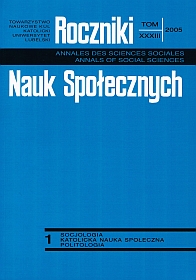Otfrieda Höffego krytyka Rawlsa teorii sprawiedliwości
Abstrakt
In 1971 J. Rawls published A Theory of Justice. It became the subject of numerous analyses that can be reduced – with respect to reactions to it – to two positions: rejection and radicalization. The rejection reaction consists in the proposition that justice, understood by Rawls as impartiality, cannot be put into practice in real life. On the other hand, radicalization may be reduced to a multidirectional development of methodological suggestions in this theory. O. Höffe, who made this analysis, should be numbered among the radicals. He mainly discovered that Rawls was not able to defend the idea of justice as impartiality. For this reason he himself makes an attempt to formulate a new theory of justice for which practical philosophy is the philosophical base, and the theory of social contract and a semantic analysis of the idea of justice are premises for construing it.
Copyright (c) 2005 Roczniki Nauk Społecznych

Utwór dostępny jest na licencji Creative Commons Uznanie autorstwa – Użycie niekomercyjne – Bez utworów zależnych 4.0 Międzynarodowe.


